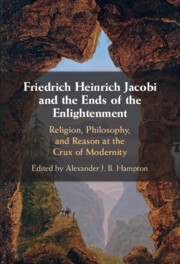 Friedrich Heinrich Jacobi and the Ends of the Enlightenment
Friedrich Heinrich Jacobi and the Ends of the Enlightenment Book contents
- Friedrich Heinrich Jacobi and the Ends of the Enlightenment
- Reviews
- Friedrich Heinrich Jacobi and the Ends of the Enlightenment
- Copyright page
- Dedication
- Epigraph
- Contents
- Contributors
- Foreword
- Acknowledgments
- Abbreviations
- Introduction
- Part I The Critique of Reason: Debates on Rationalism, Empiricism, and Skepticism
- Part II Faith and Revelation: Debates on Theism, Atheism, and Nihilism
- Part III Jacobi and the Revival of Socraticism: The Muenster Circle and Existentialism
- 9 Jacobi and Hemsterhuis
- 10 Dioscuri
- 11 Jacobi and Kierkegaard
- Part IV Jacobi’s Impact on Idealism and Romanticism
- Jacobi Sources
- Index
- References
9 - Jacobi and Hemsterhuis
from Part III - Jacobi and the Revival of Socraticism: The Muenster Circle and Existentialism
Published online by Cambridge University Press: 09 February 2023
- Friedrich Heinrich Jacobi and the Ends of the Enlightenment
- Reviews
- Friedrich Heinrich Jacobi and the Ends of the Enlightenment
- Copyright page
- Dedication
- Epigraph
- Contents
- Contributors
- Foreword
- Acknowledgments
- Abbreviations
- Introduction
- Part I The Critique of Reason: Debates on Rationalism, Empiricism, and Skepticism
- Part II Faith and Revelation: Debates on Theism, Atheism, and Nihilism
- Part III Jacobi and the Revival of Socraticism: The Muenster Circle and Existentialism
- 9 Jacobi and Hemsterhuis
- 10 Dioscuri
- 11 Jacobi and Kierkegaard
- Part IV Jacobi’s Impact on Idealism and Romanticism
- Jacobi Sources
- Index
- References
Summary
The chapter provides a study of François Hemsterhuis’ affinities with and influence on Jacobi’s Über die Lehre des Spinoza in Briefen an den Herrn Moses Mendelssohn. Both Hemsterhuis and Charles Bonnet significantly influenced Jacobi’s thought and the development of German idealism while providing the foundation for an alternative understanding of Spinoza.
- Type
- Chapter
- Information
- Friedrich Heinrich Jacobi and the Ends of the EnlightenmentReligion, Philosophy, and Reason at the Crux of Modernity, pp. 155 - 175Publisher: Cambridge University PressPrint publication year: 2023
References
- 1
- Cited by


